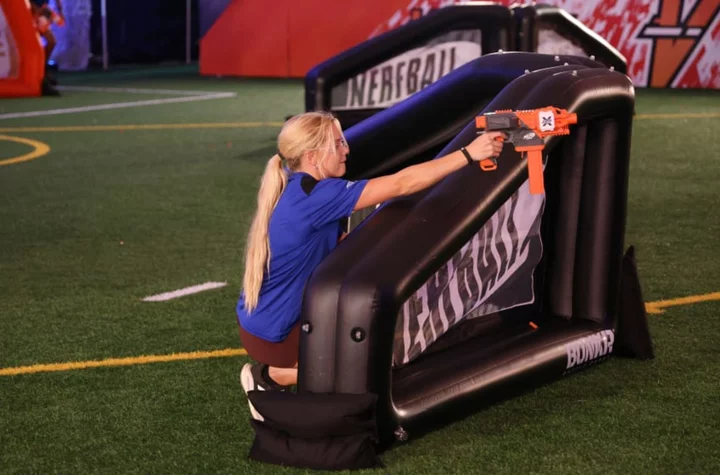The concept behind 'Nerfball' — the first official team sport in the history of Nerf — entered the world roughly four years ago. In the time since, there has been a rigorous process to develop the gameplay and finalize the rulebook.
On the surface, it's an amalgamation of more traditional games — laser or dart tag, crossed with basketball, handball, paintball, football. You name a sport, and you can probably find an element at least partially resembled in the Hasbro's new 'active play' gambit.
Dig deeper, however, and there's one element in particular that has a chance to make Nerfball stand out from the crowd — inclusivity. It's an element Teresa Pearson, Vice President of Global Franchise Strategy and Management at Nerf, was keen to emphasize in her sit-down with FanSided.
"Inclusivity is a focus on the business and the brand itself, but this was natural," she said. "It wasn't forced. It was [something of] a mission for us as a business, we've allowed it to cultivate itself. We brought it this diversified cast of athletes, all different disciplines, all different backgrounds. Really, to level the playing field and showcase that all people can play Nerf."
Hasbro brings inclusive new sport to market with 'Nerfball'
The game centers on two core components: the ball and the blaster. At the professional level shown at 'Battle in the Bubble,' Nerf's launchpad event at IMG Academy in Bradenton, Florida, the game is played five-on-five. Each player gets a blaster with four 15-dart magazines per four-minute quarter (of which there is four per game). From there, each dart hit registers as one point. Each time the ball is shot through a hoop — the ball is roughly the size of a soccer ball — the scoring team gets six points.
The only other wrinkle is the 'respawn,' which borrows its terminology and general function from the videogaming world. When a player gets hit with a dart (on the torso or legs), that player must run to the 'respawn' zone, located where the end zone would be on a football field. There, a player 'respawns' and waits at a podium while a teammate joins the fray. The cycle repeats throughout the game.
The teams at 'Battle in the Bubble' were comprised of elite college and high school athletes from all over the country — male and female. A large portion of the rosters were basketball players, but football, softball, lacrosse, and track and field also entered the mix. It was a diverse group of different ages and demographics, and the game itself showcased exactly what Nerf was aiming for.
"The [blaster] always had the ability to level the playing field," said Adam Kleinman, Senior Vice President and General Manager of Global Brands at Nerf. "That was at the center of a lot of the thinking that we had and it was the center of this tournament."
The multi-faceted nature of 'Nerfball' is precisely what makes it so adaptable and accessible. There is value derived from being a good shooter of the actual Nerfball, but it's equally important to be coordinated and effective with the blaster. Different players on the team can inhabit different roles.
There is also the leadership aspect of the game. Especially in the early years, the biggest hurdle for players will be conceptualizing and strategizing. It's a challenge to simply keep your team on the same page and organized within the geography of the playing field. A good communicator with a watchful eye and a loud voice is essential, even if that player's shooting or blasting abilities are limited.
That inclusivity was on full display at 'Battle in the Bubble.' Jada Williams, a freshman women's basketball player at Arizona, and Jessica Garnder, a track star at Nebraska, were far and away the loudest voices on the field. Williams was also lauded by her teammates as the best blaster on Team IMPACT, while the winning group — Team VELOCITY — was spearheaded by two made goals from Hannah White, who plays college basketball at Cleveland State.
The ability to "level the playing field," as Kleinman states, is a unique advantage Nerfball will have over other sports on the market.
Why We Play features stories about the power of sports to bring us together, overcome obstacles, make positive change and reach everyone. Read more here.

